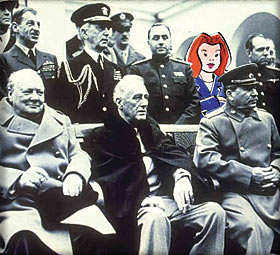Back to the future in Yalta

Roula Khalaf, Editor of the FT, selects her favourite stories in this weekly newsletter.
Walking around the Italian garden in the Livadia Palace in Yalta last weekend, I could not help but feel the weight of history. It was here that Stalin, Roosevelt and Churchill were photographed in February 1945 as they worked out who got what at the end of the second world war.
These days Yalta continues to make history, albeit with fewer far-reaching consequences. The annual Yalta European Strategy Meeting, a sort of mini Davos with better architecture, is hosted here by businessman and philanthropist Victor Pinchuk. The Ukrainian billionaire founded the event in 2004, when he persuaded 30 people to come together to discuss and plan Ukraine’s best approach to joining the EU. These days the meeting is quite a bit bigger.
I first met Pinchuk when he rescued me from the side of the road after I broke my arm in Davos last year. But I confess that until I boarded my flight to Kiev last week, I had not even looked up the country in an atlas. I can neither speak nor read a word of Ukrainian. I realise that most middle-aged residents of South Oxfordshire probably don’t either – but then they were not trying to navigate their way round Yalta by foot. At night.
Attending a conference about a country I had never visited was a somewhat surreal experience, but I learnt that about one-third of this year’s 200 or so participants were also Ukraine first-timers. It says something about the conference that three delegates who were genuinely familiar with Ukraine (as opposed to merely having been picked up off an icy pavement by one of its billionaires) were Bill and Hillary Clinton, and Tony Blair.
Bill Clinton and Blair, sharing a platform for a debate about the future of Ukraine, looked tanned and fit in the way that people who have run countries but retired early enough to pursue more lucrative second careers do. Hillary Clinton, who spoke at dinner, looked, by contrast, like someone whose third (or fourth? or fifth?) career was yet to happen, and who is ready to run a country.
She praised not only Pinchuk but his wife Elena, whose AntiAids Foundation will be 10 this year. Trust a woman to remember to thank another woman.
Shimon Peres, Larry Summers and General David Petraeus were all there, offering their views on the future of Ukraine, the world, or indeed anything that anyone asked them about. Presumably they were so far from home that they felt confident no one would report it.
So too was Dominique Strauss-Kahn; his official biography for the event stated sternly that he “likes to ski and play chess”.
There were also what seemed like scores of hitherto unheard of – to me, anyway – but highly influential European politicians around. I was glad to learn that the European Commissioner for Enlargement was present, but then I have always thought that was a job description that must make for an interesting business card.
Unsurprisingly, security was tight – I have never experienced such a thorough handbag check. These are always embarrassing for me anyway, because I do tend to chuck just anything in. Note to self: when attending world-leader-studded events, take small handbag containing minimal items. The thoroughness even extended to a team photo, all staged and finished in 15 minutes: no mean feat, as anyone who has ever had a school photo taken will know.
Seeing how hard Pinchuk and his colleagues are working on getting Ukraine into the EU makes me wonder why many in the UK are so nonchalant about our own membership. In November, Ukraine has a chance of signing an Association Agreement, the first step to EU membership. If it does, it might not make the history books the way that 1945 meeting did.
But it would, not least for Ukraine, be a truly historic moment.
Comments